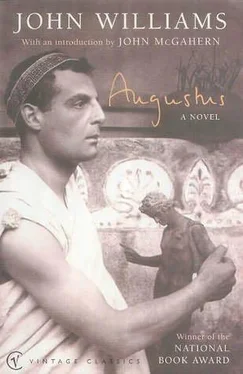John Williams - Augustus
Здесь есть возможность читать онлайн «John Williams - Augustus» весь текст электронной книги совершенно бесплатно (целиком полную версию без сокращений). В некоторых случаях можно слушать аудио, скачать через торрент в формате fb2 и присутствует краткое содержание. Жанр: Историческая проза, на английском языке. Описание произведения, (предисловие) а так же отзывы посетителей доступны на портале библиотеки ЛибКат.
- Название:Augustus
- Автор:
- Жанр:
- Год:неизвестен
- ISBN:нет данных
- Рейтинг книги:3 / 5. Голосов: 1
-
Избранное:Добавить в избранное
- Отзывы:
-
Ваша оценка:
- 60
- 1
- 2
- 3
- 4
- 5
Augustus: краткое содержание, описание и аннотация
Предлагаем к чтению аннотацию, описание, краткое содержание или предисловие (зависит от того, что написал сам автор книги «Augustus»). Если вы не нашли необходимую информацию о книге — напишите в комментариях, мы постараемся отыскать её.
Augustus — читать онлайн бесплатно полную книгу (весь текст) целиком
Ниже представлен текст книги, разбитый по страницам. Система сохранения места последней прочитанной страницы, позволяет с удобством читать онлайн бесплатно книгу «Augustus», без необходимости каждый раз заново искать на чём Вы остановились. Поставьте закладку, и сможете в любой момент перейти на страницу, на которой закончили чтение.
Интервал:
Закладка:
For twenty-seven days, in bitter cold, through drifts of snow and in swirling winds, we struggled over mountains and unprotected plains; and upon eighteen separate occasions we were attacked by the mounted archers of the perfidious Phraates. They swooped from everywhere-upon our rear, our flanks, our fronts; let fly their arrows before we could prepare ourselves; and then were gone back into their barbaric darkness, while the poor blind animal that was their victim lumbered on.
It was in these awful days of retreat that your Marcus Antonius showed himself to be the man that he is. He endured all the hardships of his men; he would take no food other than that taken by his comrades, who were reduced to gnawing roots and foraging for insects in rotting wood; nor would he wear clothing warmer than they wore themselves.
We are in Armenia now, where we cannot stay; the King of this country, nominally our ally but no more trustworthy than our foe, has furnished us with a little food. We leave for Syria soon. But I have made an accounting of our losses, and I give them to you.
In these five months, we have lost nearly forty thousand men, many to Parthian arrows, but more to the cold and disease; of these, twenty-two thousand were Antonius's Roman veterans, the best warriors in the world, it is said; and these cannot be replaced, unless Octavius Caesar consents to replace them-and that is not likely. Virtually all the horse is gone. We have no reserve of supplies. We have no clothing, except the rags we wear. We have no food, save that which is in our bellies.
Thus, Revered Queen, if you wish to save even a remnant of this army, you must accede to your husband's request for supplies. Out of his pride, he may not, I fear, wish you to know how desperate his plight is.
IV. Memorandum: Cleopatra to the Minister of Supplies (36 B. c.)
You are hereby authorized to procure and prepare for shipment to the Imperator Marcus Antonius at the port of Leuke Kome in Syria the following items:
•
Garlic: 3 tons •
Wheat or spelt, according to supply: 30 tons •
Salt fish: 10 tons •
Cheese (of goat): 45 tons •
Honey: 600 casks •
Salt: 7 tons •
Sheep, ready for slaughter: 600 •
Sour wine: 600 barrels
In addition to above items: if there is significant surplus of dried vegetables in the silos, you are to include that surplus in your shipment. If there is no surplus, you are to allow the foregoing to suffice.
You are also to procure a sufficient quantity of heavy woolen cloth, of the second quality (240,000 yards of the broad width) to manufacture 60,000 winter cloaks; sufficient coarse linen (120,000 yards of the middle width) for the manufacture of a like number of military tunics; and sufficient cured leather (soft) of horse or bullock (2000 skins) to manufacture a like number of pairs of shoes.
Speed is crucial in this matter. You are to assign a sufficient number of tailors and bootmakers to the appropriate ships so that the manufacture of these items may take place there and be completed in a voyage of eight to ten days.
The ships (twelve in number, waiting in the Royal harbor) will be made ready to sail within three days, at which time all procurement and loading must have been completed. The displeasure of your Queen would attend your failure.
V. Memorandum: Cleopatra to the Minister of Finance (36 B. c.)
Despite whatever orders or requests you may receive, either from his representative or from Marcus Antonius himself, you are to disburse no monies from the Royal treasury without the explicit approval and authorization of your Queen. Such approval and authorization is to be honored only if it is delivered by hand by a known representative of the Queen herself, and only if it bears the Royal seal.
VI Memoranda: Cleopatra to the Generals of the Egyptian Army
(36 B.C.)
Despite whatever orders or requests you may receive, either from his representatives or from Marcus Antonius himself, you are neither to allocate nor promise any troops from the Egyptian army without the explicit approval and authorization of your Queen. Such approval and authorization is to be honored only if it is delivered by hand by a known representative of the Queen herself, and only if it bears the Royal seal.
VII. Letter: Cleopatra to Marcus Antonius, from Alexandria
(winter, 35 B. c.)
My dear husband, the Queen has ordered that the needs of your brave army be filled; and your wife like a trembling girl flies to meet you, as rapidly as the uncertain winter sea will carry her. Indeed, even as you read this letter, she is no doubt at the prow of the ship that leads the line of supply, straining her eyes in vain for the Syrian coast where her lover waits, cold in the weather, but warm in the anticipation of her lover's arms.
As a Queen, I rejoice at your success; as a woman, I bewail the necessity that has kept us apart. And yet during these hurried days since I received your letter, I have concluded (can I be wrong?) that at last woman and Queen may become one.
I shall persuade you to return with me to the warmth and comfort of Alexandria, and to leave the completion of your success in Parthia for another day. It will be my pleasure to persuade you as a woman; it is my duty to persuade you as a Queen.
The treasons that you have seen in the East have had their birth in the West. Octavius plots against you still, and libels you to those whose salvation is to love you. I know that he has tried to subvert Herod; and I am persuaded by all the intelligence that I can gather that he is responsible for the defections of the provincial legions that hampered your success in Parthia. I must convince you that there are barbarians in Rome as well as in Parthia; and their use of your loyalty and good nature is more dangerous than any Parthian arrow. In the East there is only plunder; but in the West there is the world, and such power as only the great can imagine.
But even now my mind wanders from what I say. I think of you, the mightiest of men-and I am woman again, and care nothing for kingdoms, for wars, for power. I come to you at last, and count the hours as if they were days.
VIII. Letter: Gains Cilnius Maecenas to Titus Livius (12 B. c.)
How delicately you put things, my dear Livy; and yet, beneath that delicacy, how clear are your brutal alternatives! Were we "deceived" (and therefore fools), or did we "withhold" some information (and were therefore liars)? I shall reply somewhat less delicately than you question.
No, my old friend, we were not deceived about the matter of Parthia; how could we have been deceived? Even before we got Antonius's account of the campaign, we knew the truth of it. We lied to the Roman people.
I must say that I am a good deal less offended by your question than by what I perceive to lie behind it. You forget that I am an artist myself, and know the necessity of asking what to ordinary people would seem the most insulting and presumptuous things. How could I take offense at that which I myself would do, without the slightest hesitation, for the sake of my art? No, it is what I perceive in the tenor of your question that begins to give me offense; for I think (I hope I am wrong) I detect the odor of a moralist. And it seems to me that the moralist is the most useless and contemptible of creatures. He is useless in that he would expend his energies upon making judgments rather than upon gaining knowledge, for the reason that judgment is easy and knowledge is difficult. He is contemptible in that his judgments reflect a vision of himself which in his ignorance and pride he would impose upon the world. I implore you, do not become a moralist; you will destroy your art and your mind. And it would be a heavy burden for even the deepest friendship to bear.
As I have said, we lied; and if I give the reasons for the lie, I do not explain in order to defend. I explain to enlarge your understanding and your knowledge of the world.
Читать дальшеИнтервал:
Закладка:
Похожие книги на «Augustus»
Представляем Вашему вниманию похожие книги на «Augustus» списком для выбора. Мы отобрали схожую по названию и смыслу литературу в надежде предоставить читателям больше вариантов отыскать новые, интересные, ещё непрочитанные произведения.
Обсуждение, отзывы о книге «Augustus» и просто собственные мнения читателей. Оставьте ваши комментарии, напишите, что Вы думаете о произведении, его смысле или главных героях. Укажите что конкретно понравилось, а что нет, и почему Вы так считаете.











